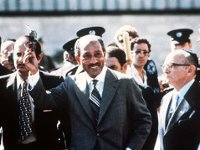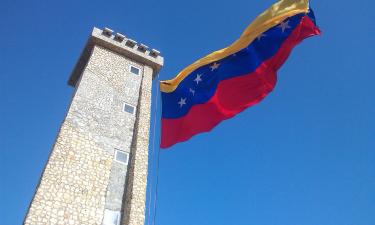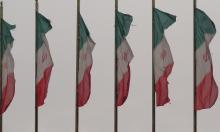Anwar Sadat, the foe of Arabs and theUSSR
Sadat, who acquired enough enemies both in the Arab world and in the Soviet Union, at the time made the right choice in favor of the alliance with Israel humiliating for the Arab world. The decision helped to maintain the peace, re-arm the army and use the American funding for the economic development. Egypt has suddenly remembered about him and gave honors to the late ex-leader.

October 6th in Egypt is marked with a double anniversary. In 1973 a strange war against Israel was launched. The war began with a victorious advance and ended in defeat 18 days later. However, Anwar Sadat considered the October War the beginning of the revival of Egypt and always arranged military parades for the occasion. Eight years later he was killed during one such parade. The assassin was a radical Islamist from al-Gama'a al-Islamiyya group, part of the Muslim Brotherhood.
The widow of the murdered president said to a local TV channel that she was grateful to President Mursi for the gesture of respect for Anwar Sadat. She added that she has not seen anything like this in thirty years. It was indeed a strange act because the Arab world was not fond of Anwar Sadat. Why did Mursi do it?
There is not much information about Mohammed Anwar Al-Sadat except that he was the president of Egypt from 1970 to 1981. He was born in 1918 and was the 13th child of a low-rank official. He graduated from the British military academy in 1938, and while in school made friends with future Egyptian President Gamal Nasser. The two founded a secret anti-British organization "Free Officers". While in the army, Sadat attempted to organize a revolt, hoping for the arrival of the Germans, but was arrested, demoted and sentenced. In 1944 he escaped and went into hiding.
Sadat took a very active part in the July Revolution of 1952, but was always overshadowed by more talented Nasser. Perhaps, the fact that his pride was wounded by always being in the second place played its role in the significant change in policy after the death of his friend.
When Sadat took office in 1970, no one in Egypt, in the West or in the Soviet Union thought that he would last long. Egypt was a secular state building the "Arab socialism." The Suez Canal, banks and industries were nationalized. The "Muslim Brotherhood" and all other political parties were banned, and the influence of the Soviet Union was overwhelming. The Americans could barely hold to the Arabian periphery not only in Egypt but throughout the Middle East. Later Sadat wrote in his memoirs that he was presented with an unattractive inheritance of crushed human dignity, human rights violations, hatred that Nasser evoked on all levels, bankrupt economy and absence of normal relations with any country.
Indeed, after the war of 1967, part of the Egyptian territory was occupied by Israel. Large military spending has undermined the country's economy, foreign capital has fled, and fellahs did not want to live in the communities. According to Soviet intelligence, Sadat was greatly influenced by his wife, Jihan Sadat, a Cypriot with English roots. It was she who incited him against the Soviet Union and pled for the development of the relations with the West. Sadat was a smart man, and was acting very carefully in order to lull the vigilance of the Soviet leadership. He arrested Ali Sabri and the rest of the members of the pro-Soviet group in the Egyptian government. In May of 1971 he signed a treaty of friendship and cooperation with the Soviet Union. In July of 1972, Sadat demanded that 15,000 Soviet specialists be withdrawn from Egypt and immediately proposed to Moscow to extend the agreement on the use of the Egyptian ports by the Soviet Navy.
The dual policy allowed Sadat, on the one hand, to obtain Soviet arms, and on the other hand, to rely on the investments from the U.S. However, in return, the Americans wanted loyalty to Israel. This was when the October War of 1973 was conceived. The strange nature of that war makes one think about a conspiracy theory. During that war, Sadat, along with the Syrian army, first advanced into the Israel territory, then stopped, stepped back and allowed Israel to seize the Golan Heights, the West of the Jordan River and Gaza Strip. Palestinians will never forgive him for that. Yet, there was a positive outcome as well.
Arab OPEC countries for the first time felt their power, introduced an embargo on oil sales to Israel and the countries of Western Europe, and increased the price of crude oil three-fold. This was the time of the infamous economic crisis of the 1970s that played a sad part in the collapse of the USSR that switched to petrodollars. In Egypt, Sadat had an image of the winner. The country, this time as a U.S. ally in the Middle East, was receiving U.S. military and economic aid.
In March of 1976, Sadat terminated the treaty on friendship and cooperation with the Soviet Union, and on September 17th of 1978 at Camp David, USA, he signed a peace treaty with Israel. As a result, he made an enemy not only with Moscow but also the entire Arab world. Syria, Libya, Algeria, Iraq and South Yemen broke diplomatic relations with Egypt. This did not prevent Sadat from winning the Nobel Peace Prize in 1978. Sadat felt his power, and offered shelter to his good friend Mohammad Reza Pahlavi, the Shah of Iran, after overthrow of the latter during the Islamic revolution of 1979.
However, the President became increasingly unpopular due to the lack of tangible improvements in the economy. His isolation in the Arab world was accompanied by criticism at home. He responded by expanding the censorship and repressing his opponents, especially the Wahhabis. Sadat entertained the world with his referendums where his actions were approved by the vote unprecedented even in the USSR. For example, in May of 1979, the Egyptian people approved the Egyptian-Israeli peace treaty with 99.9 percent of votes.
On September 3, 1981 a large raid on the opposition was organized. 1,500 opponents and critics from all areas were arrested, including Communists, Naser supporters, "Muslim Brotherhood" members, scientists and liberal journalists. Even the Coptic Pope Shenouda III was placed under house arrest. Sadat shut down the opposition newspaper El-Shaab ("People"), and a referendum indicated that his actions were approved by nearly 99.5 percent of the Egyptians.
This was the last straw for the Islamists. Spiritual leader and religious teacher of "al-Gama'a al-Islamiyya," Omar Abdel-Rahman, issued a fatwa against Sadat and on October 6th of 1981 members of the group Lieutenant Khalid Islambouli killed him at the parade. Another 10 people were killed and 28 bystanders injured, including future President Hosni Mubarak. Many were happy about Sadat's death. There is information that between 1977 and 1981, the Egyptian security forces prevented 38 assassination attempts and one coup attempt.
Why did Mursi thought of President Anwar Sadat? Perhaps, because the Egyptian army is equipped better than others, and has the latest weapons systems that the U.S. does not supply even to its allies in NATO. Maybe because it is the largest economy in the region, and because the Egyptians have been living in peace for 70 years. Probably, considering the unfortunate fate of the socialist camp, pragmatic Anwar Sadat who pulled Egypt out of the swamp of the Arab-Israeli conflict made quite the right choice. It is not his fault that the following American administrations bought the contempt, if not the hatred, of the peoples of the region with the money of the American taxpayers, Mursi said.
Lyuba Lulko
Pravda.Ru
Subscribe to Pravda.Ru Telegram channel, Facebook, RSS!





